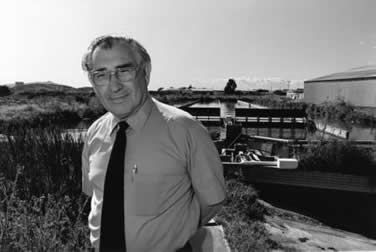

|

|
IN MEMORIAM
William J. Oswald
Professor of Civil and Environmental Engineering, Emeritus
Professor of Public Health, Emeritus
Berkeley
1919 – 2005
William J. (Bill) Oswald, professor emeritus of civil and environmental engineering and professor emeritus of public health, died peacefully at home from pancreatic cancer on December 8, 2005. Professor Oswald retired from the University of California, Berkeley in 1990 but remained active in research and engineering practice until just before his death. Bill was born in King City, California on July 6, 1919 and grew up on a “dry farming” ranch in Central California. His interest in the provision of safe water and the prevention of water contamination and pollution formed early in his life. His interest in sanitation continued in his military service during the Second World War. He was a commissioned officer in the U.S. Army Medical Corps responsible for food and water safety at a D-Day invasion camp in England. Following the war he was a hospital administrator in continental Europe.
After demobilization, Bill came to Cal for undergraduate study in civil engineering. He graduated in 1950 and stayed on for the M.S. (awarded in 1951) and the Ph.D. (awarded in 1957). Following the completion of his Ph.D. he joined the Berkeley faculties of civil (sanitary) engineering and public health. He moved through the ranks becoming a full professor in 1970. Additional affiliations at Berkeley have been with the faculty of the Energy and Resources Group and with the Lawrence Berkeley National Laboratory, Earth Sciences Division, as a senior scientist.
Bill Oswald was a unique, innovative and creative combination of educator, engineer, scientist and inventor. His interests ranged from the treatment of wastewater using algal systems to the development of closed ecosystems for space stations to the production of algal products from waste materials. In all these areas the reclamation of either domestic or industrial wastewater was the primary target. Because of his work the design and use of oxidation pond systems for the effective treatment of wastewater could be accomplished on sound biological and engineering principles. In his designs he was able to integrate the treatment of wastewater with solar energy and the further capture of energy in the form of methane. These efforts make him one of the earliest, and certainly one of the longest serving, practitioners of sustainable technology – a field that is “all the rage” nowadays. His pioneering and sustained work received worldwide recognition, including in 2005, the lifetime achievement award from the International Society for Applied Phycology. In 1998 the New Yorker magazine observed that “Oswald is to algae like Michael Jordan is to basketball”.
He was a highly respected and greatly revered mentor to his students and collaborators. He was always kind, modest, happy, positive and full of fun and ideas. His colleagues talked about him as “a humanitarian above all else” and as “an engineer who has contributed to wastewater treatment, and hence to public health, in the less developed world, more than anybody else”.
He is survived by his wife of 60 years, Eileen; sons, Patrick and Michael Oswald, eight grandchildren; and a sister, Roberta.
David Jenkins
Robert C. Cooper
Elahe Enssani